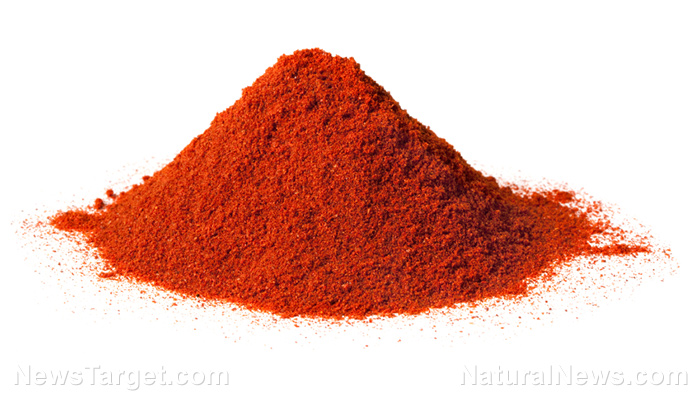Spice up your life with paprika, and experience a bevy of health benefits
02/24/2019 / By Ellaine Castillo

Make your life a little less boring by using some paprika. This spice is produced from different varieties of Capsicum annuum peppers, including hot red chili peppers and sweet bell peppers. It is perfect for people who want just the right amount of spice since paprika is not as hot as crushed cayenne and jalapeno peppers.
Paprika is rich in vitamin and minerals that confer a wide range of health benefits. Because of this, many people have started using it not just for culinary purposes but medicinal ones as well. Some of the health benefits that you can reap from paprika include the following:
- Improved eye health — Paprika is rich in carotenoids like zeaxanthin, lutein, beta-carotene, and beta-cryptoxanthin. These have potent antioxidant properties that protect the eyes against cellular damage. Lutein and zeaxanthin, specifically, are known for their protective effects against damage to due sunlight exposure, which can lead to cataracts and age-related macular degeneration. Meanwhile, the body converts beta-cryptoxanthin and beta-carotene into vitamin A. This nutrient helps in the conversion of light into brain signals and also stimulates skin cell production.
- Improved digestive health — If you suffer from indigestion then paprika might be the answer to your problems. It triggers acid production in the stomach, which is essential for breaking down and absorbing nutrients in food. It also boosts the production of saliva for digestion.
- Healthy blood sugar levels — The capsaicin found in paprika is beneficial for patients with diabetes. This compound improves sugar metabolism and helps maintain healthy blood sugar levels. Additionally, studies have shown that capsaicin in paprika is beneficial for women with gestational diabetes. This is because of its ability to prevent blood sugar spikes, improving insulin levels, reducing the chances of giving birth to babies that are larger-than-normal.
- Improved blood circulation — Paprika contains high levels of potassium and vitamin B6. Potassium widens blood vessels so that blood can flow properly, which in turn reduces the risk of heart attacks, strokes, and atherosclerosis. Meanwhile, vitamin B6 lowers blood pressure and heals damaged blood vessels. In addition to these two nutrients, paprika is rich in vitamin E, a potent antioxidant that prevents oxidative stress-induced damage on the blood vessels and heart. (Related: Paprika is a great spice to assist your cardiovascular system.)
- Enhanced sleep — Vitamin B6 in paprika is also beneficial for those who are sleep deprived. This nutrient aids in the production of the “sleep hormone” melatonin which is essential for maintaining a regular sleep cycle. Aside from this, vitamin B6 boosts the production of serotonin and norepinephrine to improve your mood and keep you stress-free.
Different types of paprika
If you’re going out to buy some paprika, you might encounter many different types on the market. These include the following:
- Conventional paprika — This type of paprika has a relatively neutral flavor since it is made from a combination of hot and sweet peppers. It is perfect for adding color and a finishing touch to your dishes.
- Sweet paprika — Sweet paprika tastes similar to red bell peppers, but without the heat. Compared to conventional paprika, it has a stronger taste and a fruity flavor.
- Hot paprika — This variety, which is made from dried chili peppers, closely resembles the taste of cayenne peppers. However, it isn’t as hot as the latter.
- Spanish smoked paprika — Also known as “pimentón de la Vera” in Spain, this spice is made from dried chili peppers that were smoked over oak. Its flavor is suitable for slow-roasted meats and stews.
If you’d like to read more news articles on the health benefits of different spices, visit NaturalHealth.news.
Sources include:
Submit a correction >>
Tagged Under:
This article may contain statements that reflect the opinion of the author
RECENT NEWS & ARTICLES
COPYRIGHT © 2017 SUPER FOODS NEWS





















